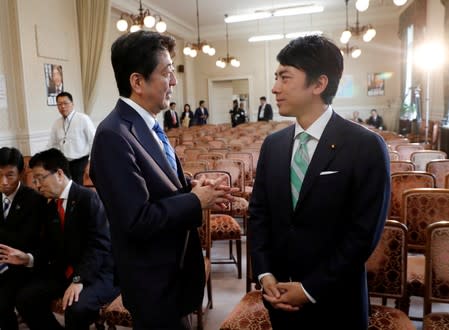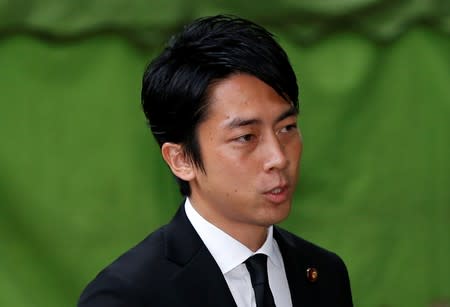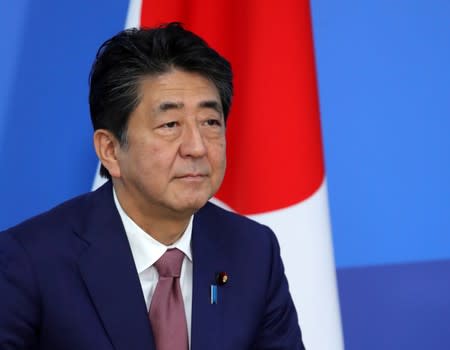Japan's Abe set to bring telegenic son of popular ex-PM into cabinet: media
By Linda Sieg
TOKYO (Reuters) - Japanese Prime Minister Shinzo Abe will draft the son of former premier Junichiro Koizumi into his cabinet and keep allies in key posts in a reshuffle on Wednesday, media reported, as Abe readies a tax rise and aims to revise the pacifist constitution.
Abe, poised to become Japan's longest-serving premier in November, will appoint telegenic Shinjiro Koizumi, 38, whom surveys show voters favour as their next leader, to the environment minister post, NHK public television reported.
The appointment, although to one of the less powerful cabinet posts, could give a popularity boost to the new line-up. Cabinet posts will be announced on Wednesday after the current cabinet resigns and officials have not commented on media reports about possible appointments.
The cabinet debut of the younger Koizumi, known as Shinjiro to distinguish him from his father, could bolster his chance of competing to succeed Abe when the prime minister's term as ruling Liberal Democratic Party chief ends in September 2021.
But it could also put him in an awkward position of having to support Abe's policy of promoting nuclear power. Junichiro Koizumi, now retired from parliament, emerged as a harsh critic of atomic energy after the 2011 nuclear disaster at the tsunami-wrecked Fukushima nuclear plant.
Shinjiro grabbed headlines last month with news that he would marry Christel Takigawa, a French-Japanese television presenter, and they will soon have a baby.
Abe is set to retain Finance Minister Taro Aso, 78, and Chief Cabinet Secretary Yoshihide Suga, 70, both of whom have served in their positions since the conservative leader returned to office in 2012, promising to reboot the economy and bolster the military, political sources and media said.
Aso must help ensure the economy weathers an increase in the sales tax to 10% from 8% in October, which could dampen consumption when a U.S.-China trade war is clouding growth.
Abe is also poised to keep veteran lawmaker Toshihiro Nikai, 80, as Liberal Democratic Party (LDP) secretary general, the party's number two post, political sources and media said.
POTENTIAL HEIRS
Several likely ministers are seen as possible contenders to succeed Abe, including his right-hand aide Suga.
Another would-be premier is Economy Minister Toshimitsu Motegi, 63, a Harvard-educated lawmaker with a reputation as a tough negotiator likely to take over at the foreign ministry from Taro Kono. Motegi will probably stay in charge of trade talks with the United States ahead of a deadline for a deal later this month, media reported.
Kono, a fluent English speaker who is well-known in Washington and has been on the front line of Japan's feud with South Korea over wartime history and trade, is in line to become defence minister, media reported.
Kono, 56, who has a reputation as a maverick and is also often mentioned as a possible successor to Abe, would replace Takeshi Iwaya, who upset some ruling LDP colleagues in June by smiling when he met his South Korean counterpart.
Another Abe ally and potential future premier, former health, labour and welfare minister Katsunobu Kato, was set to return to his old post, NHK said.
"Shinjiro's appointment will heat up the post-Abe succession battle," said one political source speaking on condition of anonymity.
Abe will also appoint a former Olympic speed skater, Seiko Hashimoto, as Olympics minister to prepare for the 2020 Games in Tokyo, one of two women likely to win posts, media said.
Abe, who could decide to seek a rare fourth term as LDP leader in 2021, has made clear he intends to pursue his goal of revising the post-war, U.S.-drafted constitution to clarify the status of the military.
The charter, if taken literally, bans a standing military but has been stretched to allow armed forces for self-defence.
Abe's task got tougher when his LDP-led coalition lost its two-thirds majority in a July upper house election. Amendments to the charter require approval by two-thirds of each chamber of parliament and a majority in a referendum.
Voter support for Abe was at 48% in a survey this month by public broadcaster NHK, little changed from August.
Social security topped the list of issues voters want the new cabinet to tackle, followed by the economy. Only 5% mentioned constitutional reform as a priority.
(Reporting by Linda Sieg; additional reporting by Makiko Yamazaki; Editing by Robert Birsel and Chizu Nomiyama)




